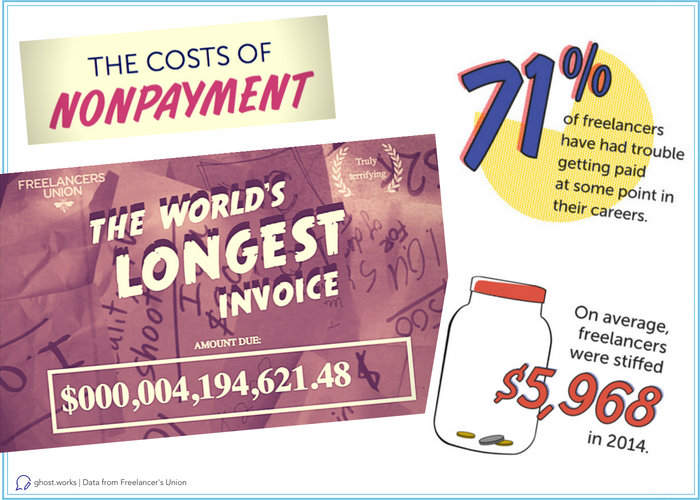This is the genesis story of Ghost Works. It's my attempt to solve problems that I've experienced as both a freelancer and corporate communicator. Our business model, combined with our brand journalism approach, helps brand marketers amplify and enhance the cadence and quality of content published to their company blogs.
Share on facebook
Share on twitter
Share on linkedin
As often happens when starting a new venture, the most common question from my network was around why I started Ghost Works. This makes sense, as we all love a good founder story.
So, as I write from the office in my converted garage in California, indulge me as I channel my best garage narrative and share the reasons why I started this business with you! It's definitely not a Jobs/Wozniak kind of story, but at least I'm championing the faded art of the garage startup.
Writers and journalists aren't paid enough -- if at all
Throughout my life as a freelancer, the fear of not getting paid for work done has been a constant. Even with clients that had previously been reliable, there have been situations where I couldn't even pay the rent because I had so many invoices outstanding.
In effect, I was extending credit with no interest to companies much larger than me. Having emergency funds is feasible, but once that's depleted, all it takes is one unpaid invoice to cause financial stress.
It almost amounts to post-traumatic stress disorder, a feeling that you've contributed and provided value and yet are not being compensated for it as agreed. You start getting nervous as the date an invoice is due approaches, wondering if you'll get paid.
The resulting chaos -- moving bills from one card to another, surfing the waves of due dates and the kindness of landlords -- is something that you never want to go through once you've done it once. Yet, despite the desire to avoid the corrosive uncertainty, it's massively complicated to budget with unpredictable cash flow.
This isn't just an isolated problem: The most recent study of freelancer wage nonpayment found a pervasive issue that amounted to around 10% of the average freelancer's wage. A count of outstanding invoices as reported by freelancers on the World's Longest Invoice sits at over $4 million! And that's just self-reported. The true scope of this issue is much larger. And as the freelance economy grows, the challenges to getting paid for work delivered will too. So for brands who employ freelancers, it's more important than ever to mitigate risk in the freelance economy!

Key insight: By deploying a business model with more revenue consistency, Ghost Works will attract better writers. This creates a virtuous cycle: better writers create better content, which keeps clients loyal and attracts new clients through word-of-mouth. Risk is mitigated on both sides, resulting in happier writers and clients.
Freelancer management is tedious
Given that most freelancers often struggle to get paid, they prioritize companies that pay quickly per the agreed-upon terms. This actually leads to a reputation of flakiness, as freelancers flock to clients they know will pay. This can lead to missed deadlines, and certain clients feeling like they're not as high of a priority as others (even if they pay on time.)
Freelancers are also generally creators, not administrators. This can lead to hassles when it comes to billing, invoicing, and other questions clients might have.
Freelancer marketplaces have sprung up to help with this issue. But now these marketplaces have become unwieldy, requiring lots of effort on the client side to find the right writer. And then, of course, the platform that facilitates the relationship takes a large cut. The middleman's cut then increases prices for everyone. To justify their cut, these platforms build bells and whistle, such as Freelancer Management Systems, which creates huge development overhead and higher costs for all customers.
An industry survey found two key hurdles when vetting freelancers: 44 percent of companies want help pre-screening talent, as they usually take days screening talent; and 47 percent struggle to evaluate talent to see if freelancers are accurately representing their expertise.
Another aspect of freelancer management, especially for B2B, is finding writers that are experts in a company's given industry. When one reliable expert writer is not available, it can be difficult to find another with similar expertise. This means the company blog might miss the scheduled weekly entry. And we all know that once momentum fades, it's hard to bring it back! This causes frustration and leads to the blog falling further down the priority list.
Key insight: By eliminating this time suck of managing the freelancer/client relationship, and by focusing on the content (rather than the platform), we're able to offer our services at a highly competitive rate. We also increase the quality and consistency of the content, as brands don't need to constantly search for writers that are experts in their industries.
'The guilt quotient:' Most brands want to blog better
Most corporate communicators, executives, and other communications professionals have some level of guilt about not publishing quality content more often.
Whether its the company blog, an internal department blog, or LinkedIn, there's an understanding that publishing high-quality content matters. It can build trust in a company and expand the reach of a brand. It can increase sales and accelerate growth. It can also amplify authority and enhance the reputation of a company's leadership in the marketplace. All worthwhile things, especially given the cost of a content marketing investment.
[Blogging better] is high on my priority list, but it's never number one. It's just not on the list of things that can kill my business tomorrow. But it's something that I know we should do, and always feel like we need to do, but can never seem to find the time.
-Potential client, sharing her challenges with the company blog
But with the proliferation of channels, publishing great content on a consistent basis is overwhelming for most. I heard that time and time again with prospects. And the more I had these conversations, the more I realized that this was a massive painpoint across industries. There hasn't been a silver bullet solution. Unprompted, colleagues shared this simple issue of prioritization when it came to the company blog or thought leadership: "We know we should do it but we don't have the time."
Key insight: Like many things in our lives, guilt can be a great motivator -- most especially when a service or product presents itself that can eliminate the guilt by providing an affordable and reliable solution to the nagging problem. If Ghost Works can solve this problem reliably, at an affordable rate, we could have very long-term clients.
The solution: Ghost Works
When crafting our core value proposition, I was careful to balance what is essentially a two-sided marketplace.
I need the writers to be happy by both paying well and providing purpose. We need top writers working for us -- after all, Ghost Works is ultimately a content play. I also need to make the price point attractive so that our clients can get started quickly, and stay with us for the long-term. Make it easy to get started and give no reasons to leave.
As a career freelancer myself, I felt that it was consistency that unites both sides of this equation.
While clients benefit from both the consistency of writing and the consistency of cost, writers benefit from both the consistency of pay and the consistency of work. Clients save time vetting and managing freelancers, and our writers save time vetting and managing clients. Both sides are relieved from the headaches of invoicing, billing by the hour, scope creep, and unexpected cost overages.
In order to make this work, I chose a new business model as the engine of our success. We offer blog management as a subscription service, giving everyone the clarity of financial consistency. Brands can budget effectively, and company cash flow is stable so our writers know that they are getting paid each month.
It's this business model innovation that will either float this entire vision or sink it. And a business model isn't always a sustainable competitive advantage. So we put the client at the center of everything we do, and then we move out from there. That's why we offer our service without contracts and a 'cancel anytime' guarantee. Simple to start, easy to use, and effective long-term.
We're on a mission to help brands blog better, and we can only do that if we are unabashedly client-centric. As long as our writing team is aligned and orbiting around each of our clients, we will most certainly achieve our mission!


